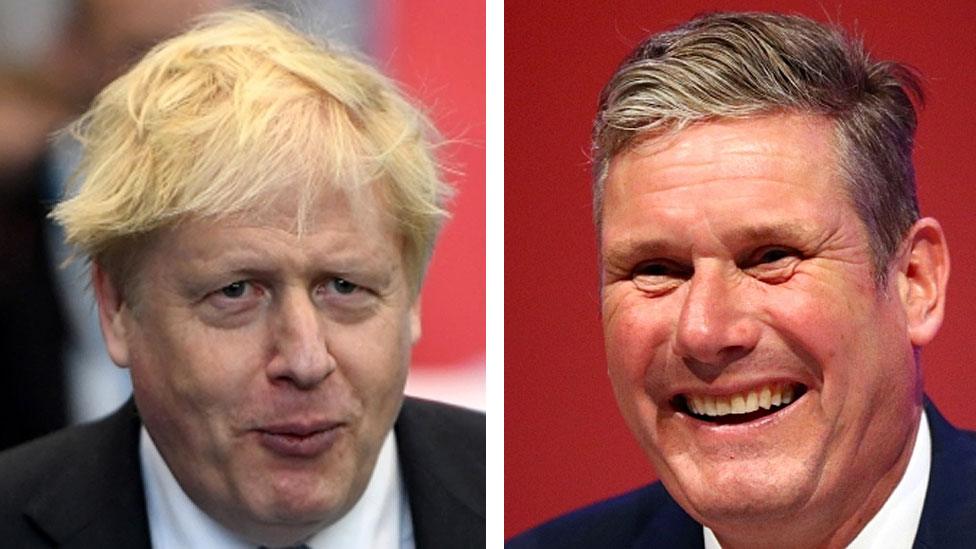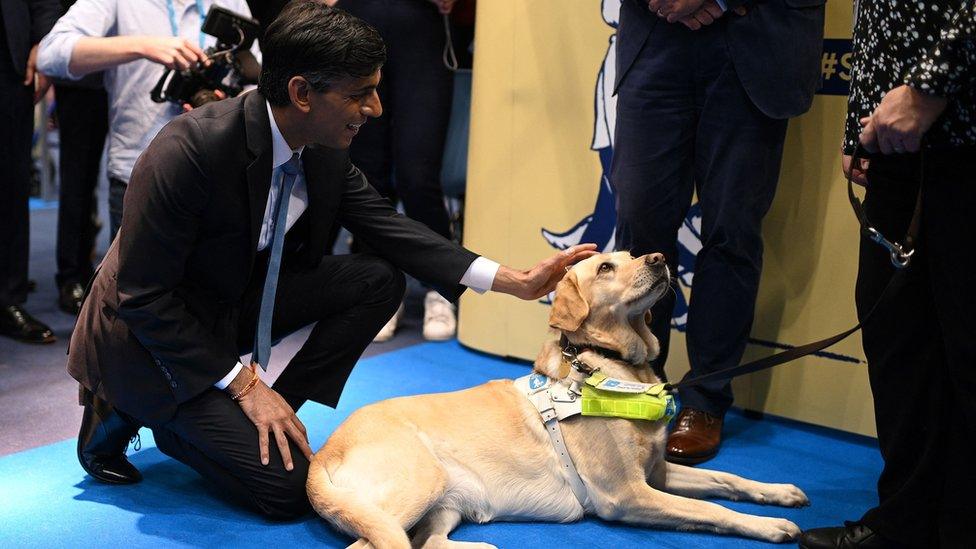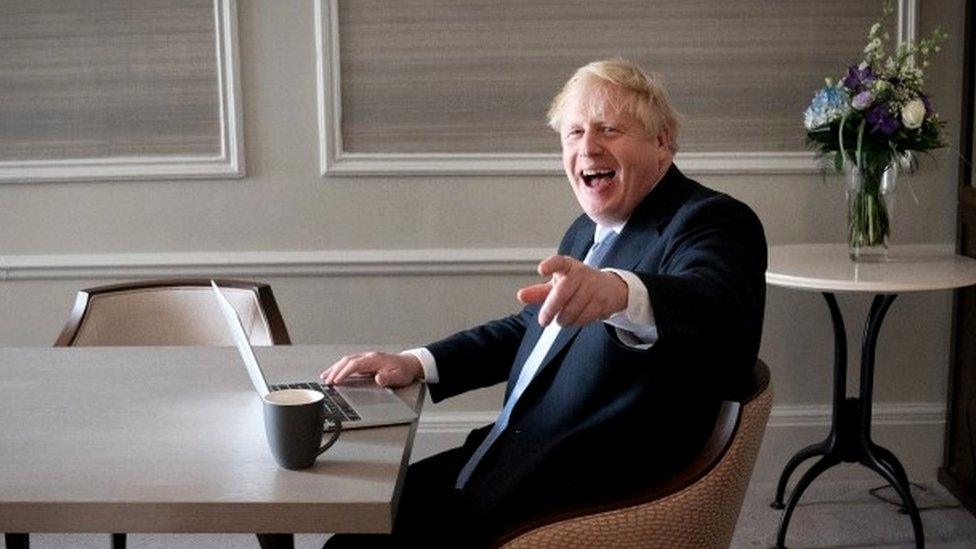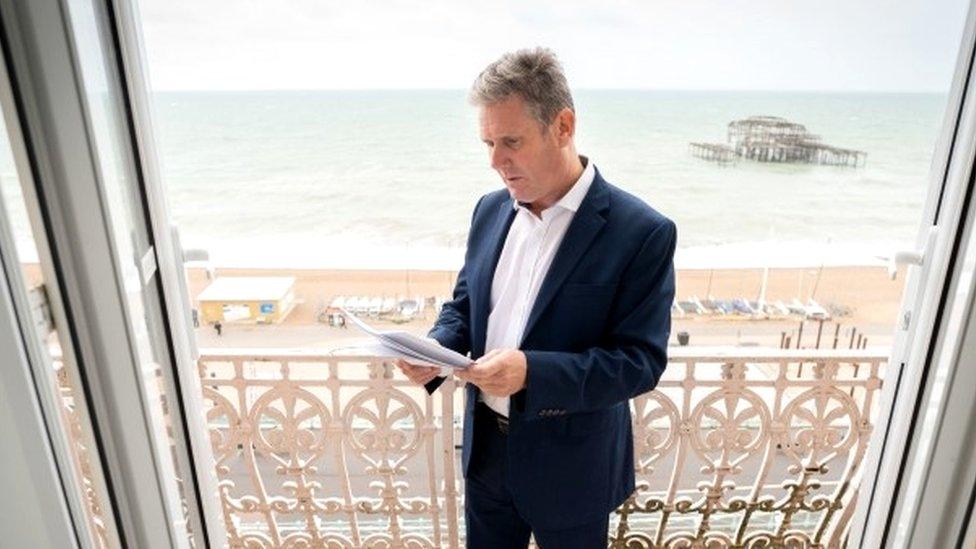Johnson and Starmer: More in common than you might think
- Published

The frenzy of conference season demonstrated that the two biggest political parties are on totally different planets. But Boris Johnson and Sir Keir Starmer have a few things in common.
Conferences are strange events, attended by a truly tiny proportion of the population.
A deeply bizarre combination of things takes place.
Hundreds of earnest speeches are made. Young activists try to infiltrate swanky parties so they can grab a moment or two to try to impress the MPs and ministers crammed inside guzzling warm wine.
Leaders make big - and sometimes very, very long - speeches.
If those speeches are humdingers, careers can be saved, or made. If they stink, careers can be sunk.

The guide dog stand at conference always draws a crowd
Hundreds of businesses and campaign groups jostle to grab attention for their wares.
Patting the guide dogs, who are brought to the exhibition hall to promote their work, is normally my favourite moment of the week.
Different looks
This year, Sir Keir Starmer and Boris Johnson both had good conferences, in terms of their own tribes.
In Manchester, the prime minister was lauded by Conservative Party members, and staged a display of his power.
There was nothing subtle about other ministers giving speeches on a small pop-up stage screened off by curtains, while Mr Johnson had his own stage built in a cavernous space next door.
Those who have an eye on his job one day, including Chancellor Rishi Sunak and Foreign Secretary Liz Truss, did not dazzle when it was their turn to speak.
Mr Johnson's close ally Mark Spencer even told us he thought the PM could be in Downing Street for 20 years.
In Brighton a week earlier, Sir Keir managed to change some of Labour's obscure, but important, rules to give him more control of the party. It gave him more grip and political confidence too.
Howls and heckles from the left might have been a distraction, but were living proof that he is trying to move the party away from Jeremy Corbyn's era.
Trials ahead
Both men, however, are facing huge problems.
Mr Johnson's government has to deal with urgent issues affecting people's standards of living - and it's not at all clear that it has effective solutions to them.
And there is concern among some senior Conservatives that the prime minister is not taking the situation seriously enough, even though, for now, Number 10 does not seem to be attracting blame from the public.

Boris Johnson's conference speech was packed with gags
One party backer, who is not exactly a fan of the PM, told me: "You hire a clown, you get a circus.
"But even though the taxi drivers don't have petrol, they still love him."
Sir Keir has legions of problems too, not least the Tories' enormous majority, which lends Mr Johnson his political dominance.

Sir Keir's speech was more sober, and much longer, than his rival's
The Labour leader's conference speech was a big political step forward, but there are nagging doubts among his colleagues about whether he will ever have the agility not just to snatch opportunities when they appear, but to create them.
There is chatter among shadow ministers that pressures on the public this autumn are starting to sour voters' seeming forgiveness of the government.
I heard this argument so many times at Labour's conference, I wondered if they were all telling each other that - a shared whisper of their hopes rather than a solid expectation.
The two leaders have both gained from the past fortnight, but neither can rest easy.
Contrasting appeals
The differences between the two were captured in the images their respective teams chose to make public of them preparing for their speeches.
Sir Keir is on a balcony overlooking the sea, studiously gazing at a few pages of A4 paper as if he is trying to memorise the lines of a sermon.
Mr Johnson is grinning at the camera, sitting at his laptop like he's delighted to have just finished writing a bawdy best man's speech and is pleased he came up with some gags.
These pictures reflect their different appeal, their contrasting characters, which can also be construed as their vulnerabilities.
But it would have been hard to find anyone leaving Brighton that believes Labour's lawyer will win the next election.
It would have been tricky to find anyone leaving Manchester thinking that the Tories' showman will lose.
But the only predictable pattern in the past five political years has been turmoil.
And the push and pull of the positives and problems for both big UK parties changes every single day.
